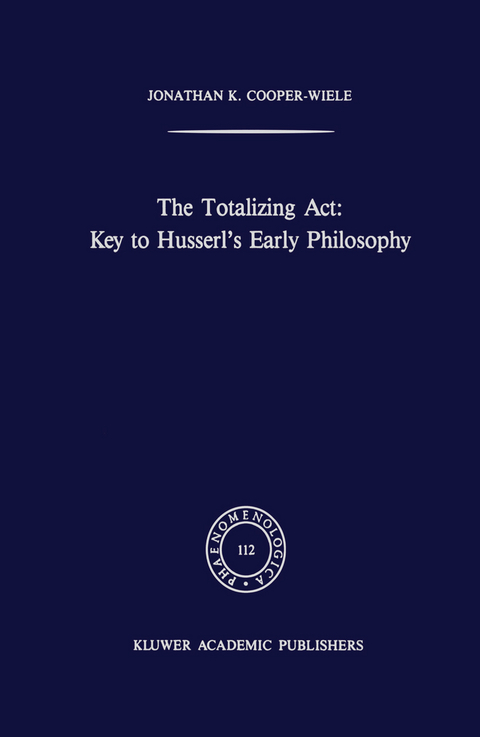
The Totalizing Act: Key to Husserl’s Early Philosophy
Springer (Verlag)
978-94-010-7512-1 (ISBN)
The Origins of Husserl's Totalizing Act At noon on Monday, October 24th, 1887, Dr. Edmund G. Husserl defended the dissertation that would qualify him as a university lecturer at Halle. Entitled "On the Concept of Number," it was written under Carl Stumpf who, like Husserl, had been a student of Franz Brentano. In this, his first published philosophical work, Husserl sought to secure the foundations of mathematics by deriving its most fundamental concepts from psychical acts.! In the same year, Heinrich Hertz published an article entitled, "Con cerning an Influence of Ultraviolet Light on the Electrical Discharge." The article detailed his discovery of a new "relation between two entirely different forces," those of light and electricity. Hermann von Helmholtz, whose theory guided Hertz's initial research, called it the "most important physical discovery of the century," and Hertz became an immediate sensation. He lectured on his discovery in 1889 before a general session of the German Association meeting in Heidelberg. In this lecture that, as he wrote beforehand to Emil Cohn, he was deter mined should not be "entirely unintelligible to the laity," Hertz explained that light ether and electro-magnetic forces were interdependent. He went on to tell his audience that they need not expect their senses to grant them access to these phenomena. Indeed, he said, the latter are not only insusceptible of sense perception, but are false from the standpoint of the senses.
Introduction: The Origins of Husserl’s Totalizing Act.- I. The Totalizing Act: Key to Husserl’s Early Philosophy.- The Totalizing Act.- The Totalizing Act as Totality.- II. The Concept of the Totalizing Act as Collective Connection: Progenitor of Number.- The Auto-Abstraction of the Concept of Collective Connection.- Number Concepts: Progeny of the Totalizing Act.- The “Attachment” of Number Concepts: Index of the Totalizing Act.- The Preeminence of the Totalizing Act: Refutation of a Prevalent Interpretation.- III. Symbolizing: Prosthesis of the Totalizing Act.- The Hierarchic Complication of Totalizing Acts.- The Anatomy of Abstracta.- The Self-Extension of the Totalizing Act by Proxy.- IV. The Symbolic Totalization of Sensible Multitudes.- The Sensible Individual as Modified Multitude.- The Symbolic Totalization of the Sensible Multitude.- V. The Intuitive Totalization of the Individual Sense Object.- The Sensible Group: Sufficient Context for Analyzing Intuition of Individuals.- The Problem: Non-Convertibility of Simultaneous and Successive Totalizing.- The Resolution: Successive and Simultaneous Totalizing as Continuous.- The Mutual Implication of Intuiting and Representing in the Intuition of the Sensible Thing.- VI. The Totalizing Act as Mediator of the Ideal and Real.- Hypothesis: The Internal Motivation for the Great Inversion.- Confirmation: The Prolegomena of 1900.- VII. The Ensoulment of Sensation: Triumph of the Totalizing Psyche.- The Immanent Object as Empiricistic Fetish.- The Psychical Production of the Transcendent Object.- The Dilemma: The Uncertainty of the Transcendent and the Imperceptibility of the Immanent.- The Great Reversal: The Causal World as Interpretation.- Afterword: A Hypothetical Answer for Alfred Schutz.- Appendices.- SelectedBibliography.
| Reihe/Serie | Phaenomenologica ; 112 |
|---|---|
| Zusatzinfo | X, 150 p. |
| Verlagsort | Dordrecht |
| Sprache | englisch |
| Maße | 155 x 235 mm |
| Themenwelt | Geisteswissenschaften ► Geschichte |
| Geisteswissenschaften ► Philosophie ► Philosophie der Neuzeit | |
| Mathematik / Informatik ► Mathematik ► Geschichte der Mathematik | |
| ISBN-10 | 94-010-7512-3 / 9401075123 |
| ISBN-13 | 978-94-010-7512-1 / 9789401075121 |
| Zustand | Neuware |
| Haben Sie eine Frage zum Produkt? |
aus dem Bereich


